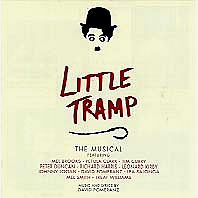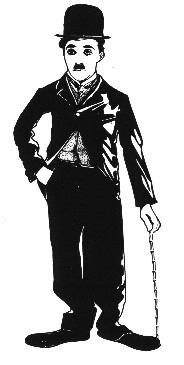LITTLE TRAMP

Book, music and lyrics by David Pomeranz
(Book co-written by Steven David Horwich)
Synopsis
Little Tramp is a musical telling of Charlie Chaplin's life story chronicling his dramatic rise, fall and ultimate triumph. The musical opens in 1971 at the Academy Awards Ceremony in LA where an 82 year old Chaplin is about to receive a special lifetime achievement award. This is a bitter-sweet affair, filled with mixed emotions because of his being barred from re-entry in the State 20 years previously. Little Tramp plays in many ways like a Chaplin movie, showing the little man overcoming enormous odds in a very funny, touching and powerful way. From the depths of poverty, through his determination and talent, he becomes one of the best known and loved human beings on the face of the earth.
The musical covers his humorous confrontations with the early "established" way of making silent pictures, his creation of the "Little Tramp" character, his unfortunate marriages and trumped-up press scandals, the FBI branding him a Communist (which he was not) and his eventual exile from the United States. In the moving finale Charlie is once again reconciled with the public and, perhaps for the first time, himself.
Story
At the 1971 Academy Awards ceremony in Los Angeles, an 82 year-old Charlie Chaplin is about to receive a special Life Achievement award. 20 years earlier, Charlie had been barred from re-entry into the United States on the grounds that he was a Communist.
Charlie looks back at his life. His mother, a failed music hall performer, trying to make ends meet to support little Charlie and his older brother Sydney, reminds her sons that they have something more than mere material possessions.
Not able to support her children, Hanna Chaplin is taken to the workhouse. The boys try selling their old clothing on the streets but there are no takers. Hungry and heartbroken, Sydney tries to cheer things up while the Charlie of 1971 rejoins them.
When Sydney joined the Navy, Charlie is left to fend for himself. Determined to help his mother, Charlie joined a dance troupe called "The Eight Lancashire Lads", but his mother's condition worsens and she is placed in an insane asylum. Dodging truant officers, Charlie sees a sign, "Blackmore's Theatrical Agency" and barges into the agent's office.
 Now grown up and a consummate English Stage comedian, Charlie is discovered by filmmaker Mack Sennett and signed to a contract at Keystone Studios in California. Sennett's style of "pie in the face" comedy is different from Chaplin's slower, more deliberate style, and when Charlie tries to assert his ideas, Sennett gives him some strong advice.
Now grown up and a consummate English Stage comedian, Charlie is discovered by filmmaker Mack Sennett and signed to a contract at Keystone Studios in California. Sennett's style of "pie in the face" comedy is different from Chaplin's slower, more deliberate style, and when Charlie tries to assert his ideas, Sennett gives him some strong advice.
Charlie is relentless. Sennett finally throws up his hands in frustration and gives Charlie a chance. Charlie becomes an overnight sensation. Film distributors, fans and theater owners can't get enough of him.
Charlie opens his own picture studio and he becomes one of the most beloved public figures. One evening, he is visited by a local chapter of Chaplin Fan Club.
By this time, Sydney returns as Charlie's personal manager. Getting ready for a swank Hollywood party, Sydney reminisces how far they've come.
Back to 1971, Charlie's wife, Oona is instructed by the show's assistant director on how Charlie should play to the camera. Furthermore, a government official then warns her that Charlie should avoid making any political comments. Oona is incensed.
The story returns to the 1920s. Charlie's career and personal life are at a low point. His mother just died, and he just underwent two bitter divorces. He is overworked, reporters are on to him and to make things worse, talking pictures are threatening his artistic survival.
Nonetheless his success continued, and Charlie revisits England to attend a Royal Premiere of City Lights. He wanders through his old neighbourhood and is stunned that injustice and poverty still exists. In an effort to improve such degenerate conditions, he decides to speak out on behalf of the Russian War Relief. He contends that it's no concern whether or not these people are Communist, they're being slaughtered by the Nazis. After one of his speeches, FBI agent Tippy Gray takes notes and reports his finding to Bureau Chief J. Edgar Hoover.
A paternity suit is filed against Chaplin, giving Hoover ammunition he needed. Although a blood test disproves the allegation, the press crucifies him. His fans turn on him and his films are boycotted. Charlie is dejected. He is convinced that it is just a matter of time before his new wife Oona leaves him too. However. Oona assures him that she won't.
The Chaplins decided to cruise Europe, but aboard the ship, Charlie receives a cable from Washington stating that in order to re-enter the U.S., he must answer to political and moral charges. Crestfallen, Charlie decided to spend the next 20 years living in Veney, Switzerland.
Back to 1971, Charlie is escorted to the stage while deeply regarding what he will tell his audience.
Principal characters (plus chorus)
Charlie Chaplin
Charlie Chaplin (age 9)
Sydney Chaplin
Sydney Chaplin (age 9)
Hannah Chaplin
Oona Chaplin
Mack Sennett
Tippy Grey
Musical Numbers
- In America Again (Charlie)
- Something No-one Can Ever Take Away (Hannah, Charlie 9, Sydney 9)
- Caviar and Cake (Charlie aged 9)
- When The World Stops Turning
- Number One (Charlie aged 9)
- 'Less It Ends With A Chase
- The Tramp/He's Got To Be Someone
- Chaplin Films (Company)
- Thank You
- Heaven (Charlie, Sydney)
- . He's Got To Be Someone (Reprise)
- Too Many Words (Charlie)
- I Got Me A Red (Tippy)
- There's Got To Be A Law
- This Is What I Dreamed (Oona)